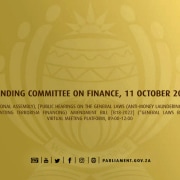|
Getting your Trinity Audio player ready...
|
The Financial Intelligence Centre (FIC) amendment bill is one step closer to promulgation. Having being tabled in Parliament as long ago as April 2015 by former finance minister Nhlanhla Nene, and sent back and forth a couple of times between President Jacob Zuma and the Standing Committee of Finance, the bill was passed last week by a unified House.
Members of Parliament have given the government until the end of the month to meet the requirements of the Financial Action Task Force (FATF) and sign into the amendments into law.
Various MPs not only agreed that Zuma should sign bills into law on a much speedier basis that he currently does, but were also critical of his decision to send the bill back to Parliament in November 2016 after receiving an objection from Mzwanele Manyi. Finance committee chairperson Yunus Carrim said the bill is constitutionally sound.
The bill is now with Zuma for the second time. It awaits his approval and signature into law.
Combating financial crime
The FIC Act (Fica) is aimed not so much at ordinary consumers, but more at entities that handle large chunks of money, such as estate agents, banks, foreign exchange service providers, trusts, attorneys and others. These are some of the channels through which criminals have been known to launder their ill-gotten gains.
The amendments were necessary because Fica in its previous form was not up to the standards of the FATF, of which South Africa is a member. The country is therefore expected to bring its relevant legislation into line with FATF, which works internationally with financial institutions to combat financial crime.
The FIC bill seeks to strengthen regulations that deal with money laundering and illicit financial transactions. It introduces provisions for banks such as the conducting of rigorous due diligence on politically exposed people, as well as the notion of politically influential persons. This means that when they use the banking system, politicians and their families will come under scrutiny.
Corruption Watch twice made submissions in Parliament on the bill, focusing initially on lack of clarity around the definition of beneficial ownership and the definition of domestic and foreign prominent influential persons.
Last month we presented submissions relating to section 45B(1C) which deals with warrantless searches in clause 32 of the bill. This is the section about which President Jacob Zuma expressed reservations, and which prompted him to refer the bill back to the National Assembly for reconsideration.
Experts are urging Zuma to sign the bill into law as soon as possible. Economist Azar Jammine predicted serious repercussions for the country if the bill is delayed yet again. “The developed economies would be highly reluctant to deal openly with South Africa, financial institutions and sources of income from South Africa,” he said.
South Africa is internationally respected for its sound financial governance – but it risks damaging this reputation if it does not take prompt action to enact the FIC bill.








